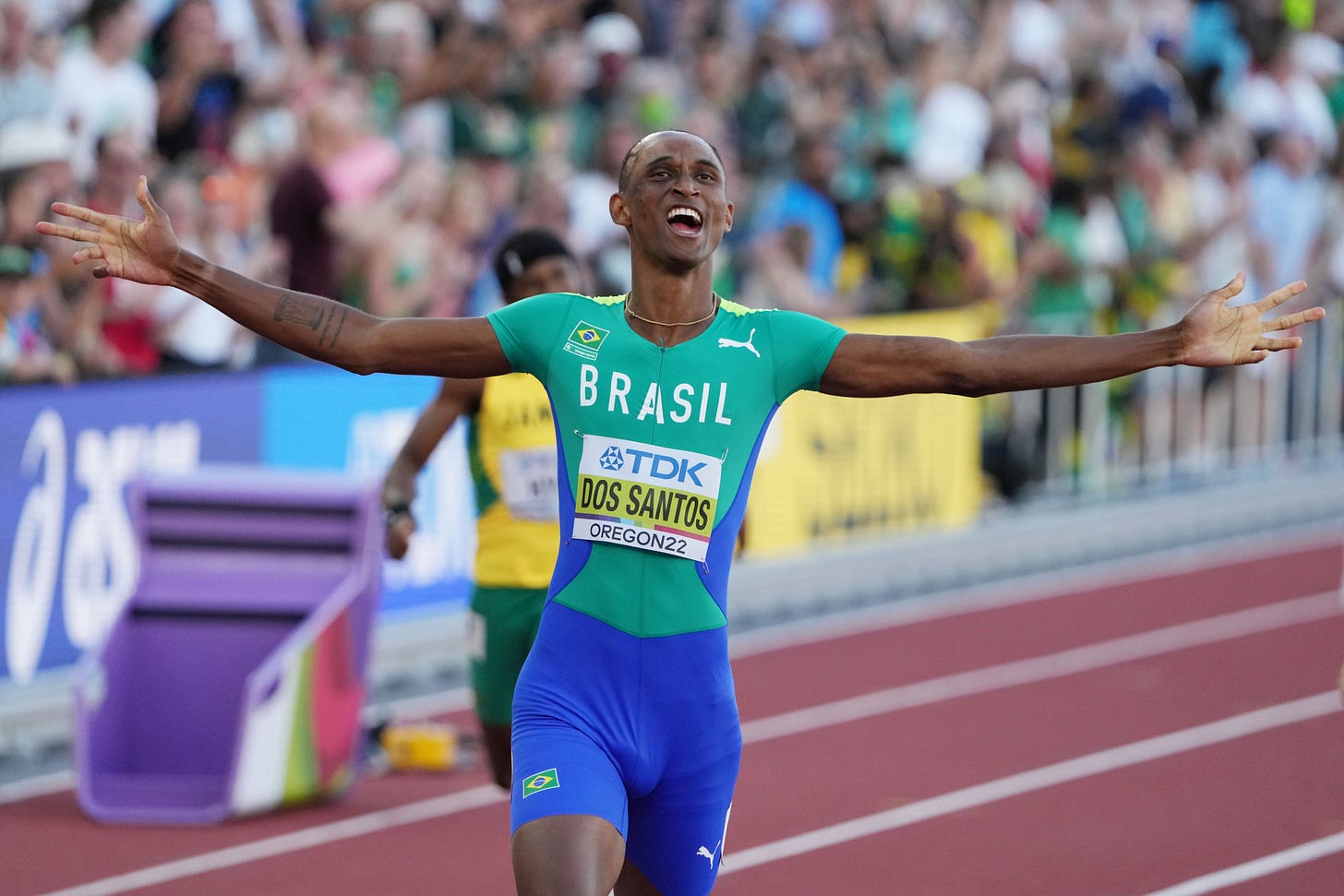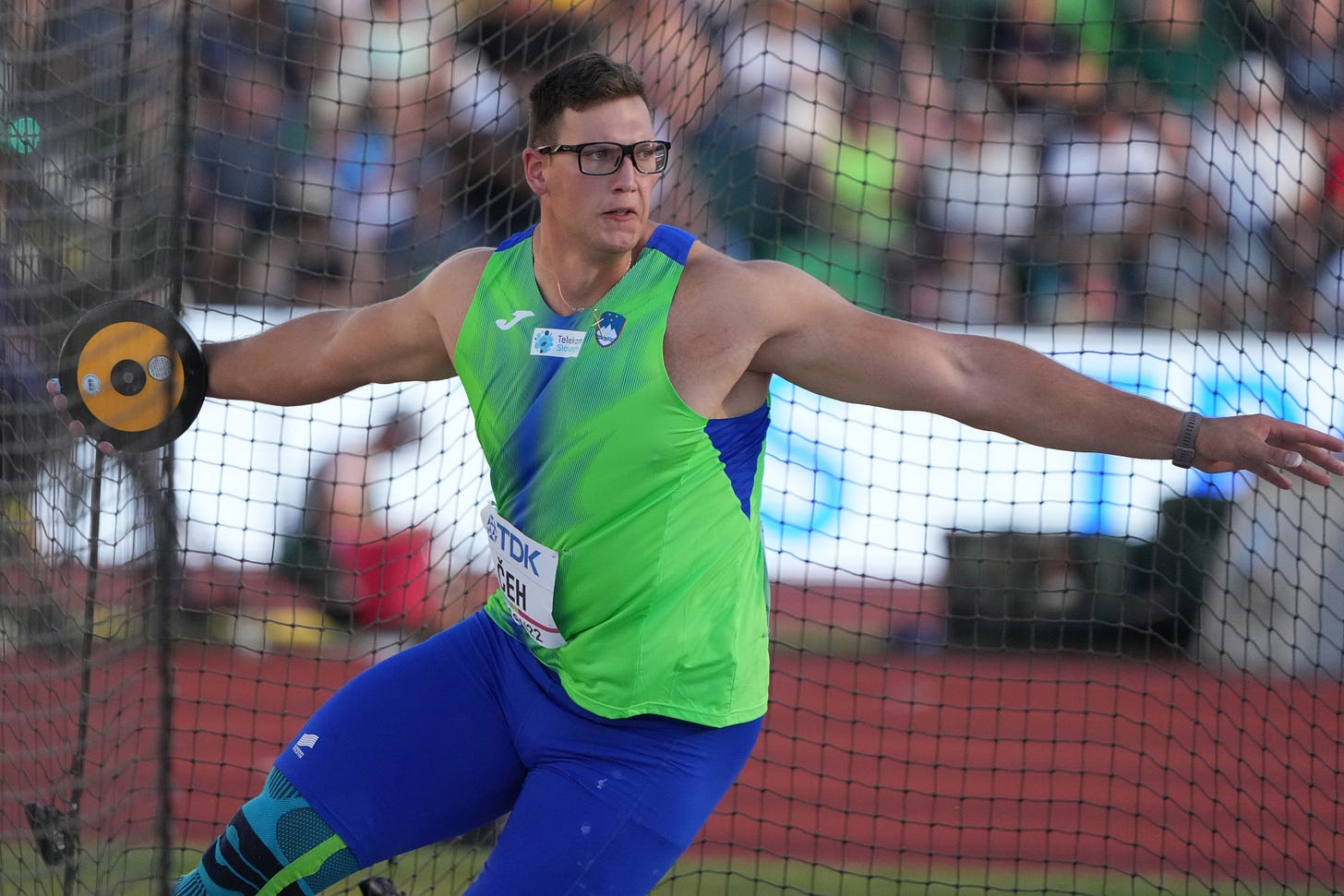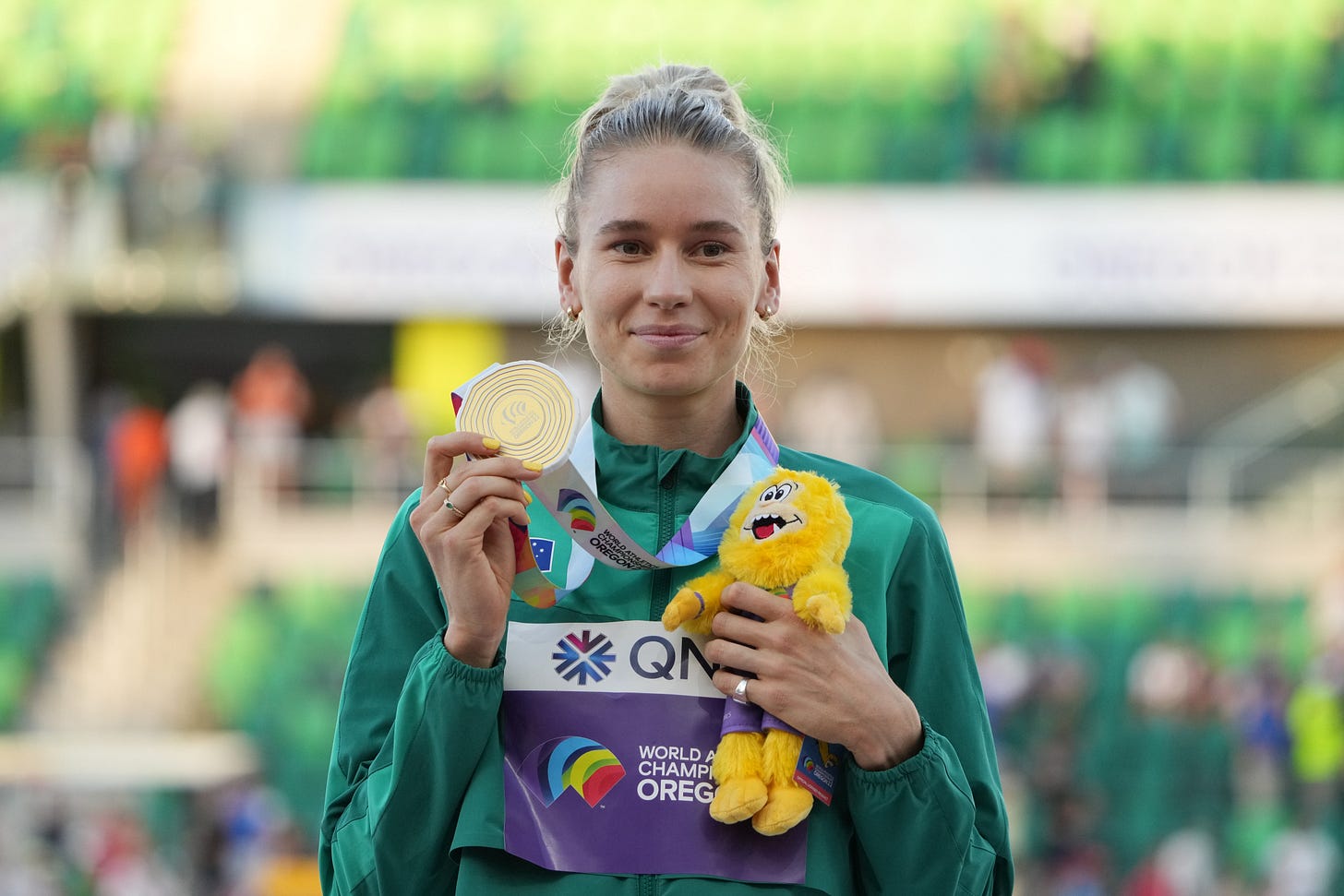Victory adds to impressive numbers
Brazilian dos Santos runs away with gold medal in intermediate hurdles in World Championships

EUGENE, Oregon – The numbers did not lie.
When it came to handicapping the men’s 400-meter intermediate hurdles in the World Athletics Championships, they were indisputably clear about who was the man to beat.
It wasn’t Karsten Warholm of Norway, who had turned in an iconic performance in the Olympic Games in Tokyo last summer when he lowered his own world record to 45.94 seconds.
Nor was it American Rai Benjamin, who had clocked 46.17 while finishing second to Warholm during his scintillating run in the Olympic final.
No, the statistics indicated that Alison dos Santos of Brazil deserved to be the favorite.
For it was dos Santos who had the fastest time in the world this year – 46.80 – entering the meet, as well as the third- fourth-, and fifth-fastest performances. He had also defeated Benjamin, 47.24 to 47.49, in a Diamond League meet in Doha, Qatar, in the middle of May after lowering his personal best in the 400 to 44.54 while finishing second in the Mt. San Antonio College Relays in the middle of April.
Warholm’s level of fitness was a big question mark coming into the meet because he had not raced since he pulled up with an injured right hamstring after clearing the first hurdle in his season-opening race in Rabat, Morocco, in early June.
Nonetheless, he looked solid on Sunday when he won his semifinal in 48.00.
He also appeared to have an advantage over dos Santos entering the final on Tuesday because he would be running in lane four while the Brazilian would be in lane six. This meant that Warholm could see dos Santos out in front of him and react accordingly, while dos Santos would not know exactly where Warholm was until they entered the home straightaway.
Warholm got off to a good start in the final, clearing the first six hurdles of the race well ahead of Benjamin, who was running in lane three. But dos Santos had pulled even with him by the time they cleared the seventh barriers and the Brazilian was in front over the eighth hurdles.
His advantage only grew after that as Warholm began to be swallowed up by the hard-charging field.
Benjamin, as is his wont, made up a lot of ground in the final 150 meters of the race, but he was too far behind dos Santos to seriously challenge him for the gold medal as the Brazilian crossed the finish line in a national record of 46.29, the third-fastest time in history.
Benjamin finished second in 46.89, the 10th fastest time in history, and U.S. teammate Trevor Bassitt, running in his first outdoor global title meet, had his typically strong finish to place third in a career-best 47.39, two hundredths of a second in front of Wilfried Happio of France.
Khallifah Rosser of the U.S. placed fifth in 47.88, followed by Jamaican Jaheel Hyde (personal best of 48.03), Warholm (48.42), and Estonian Rasmus Magi (48.92).
"I didn't care about the time because this is the first time I win a world title,” dos Santos said in a story in Reuters. “I think I can run faster than it. I don't think you will have a perfect race. I'll always look for ways to improve."
While dos Santos’ victory was not a complete surprise, it would be fair to say few people, if any, had picked 28-year-old Jake Wightman of Great Britain to win the men’s 1,500 meters on Tuesday by surging past favored Jakob Ingebrigtsen of Norway with 230 meters left in the race and then holding him off in the home straightaway.
For it was less than five weeks ago that Ingebrigtsen had run a Norwegian record of 3 minutes 46.46 seconds in the mile to finish nearly four seconds in front of third-place Wightman (3:50.30) in a Diamond League meet in Oslo.
Abel Kipsang of Kenya led the field through the first 400 meters in 55.51 seconds and Olympic champion Ingebrigtsen was in front at the 800-meter mark in 1:52.04.
He still led when he came through 1,200 meters in 2:48.28, but Olympic silver medalist Timothy Cheruiyot of Kenya, Wightman, and Kipsang were close behind him.
The crowd erupted when Wightman passed Ingebrigtsen with about 230 meters left in the race, and their roar intensified when it became clear that Wightman was going to win the race and Ingebrigtsen was going to have to worry about holding off fast-closing Spaniard Mohamed Katir for the silver medal.
Wightman’s time of 3:29.23 was a personal best and the fastest in the world this year. Ingebrigtsen finished second in 3:29.47, followed by Katir in 3:29.90. Cheruiyot finished sixth in 3:30.69 and Kipsang was seventh in 3:31.21.
Wightman’s victory was the first by a British runner in the men’s 1,500 in the World Championships since 1983 when Steve Cram won the event in the inaugural meet in Helsinki.
The win came in front of both his parents, as his father, Geoff, was the public address announcer who called the race, and his mother, Susan, was in the stands.
“I've been dreaming of this since I was eight years old,” Wightman told World Athletics. “Having my mom in the stands and my dad calling the race at the stadium, what else could I ask for?”

Kristjan Ceh of Slovenia and Eleanor Patterson of Australia won the two other finals contested on Tuesday.
Ceh set a meet record of 71.13 meters (233 feet 4 inches) in the men’s discus and Patterson cleared 2.02 (6-7½) in the women’s high jump.
The 23-year-old Ceh had been the dominant thrower in the world this season and he had the top two throws in the competition. In addition to his winning throw in the third round, he also had a 70.51 (231-4) effort in round five.
The Lithuanian duo of Mykolas Alekna and Andrius Gudzius finished second and third with throws of 69.27 (227-3) and 67.55 (221-7), respectively.
Alekna, a 19-year-old who just finished his freshman year at UC Berkeley, is the son of Virgilijus Alekna, a two-time Olympic and two-time World champion who is regarded as one of the greatest discus throwers of all time.
Daniel Stahl of Sweden, the defending World and Olympic champion, finished fourth with a best of 67.10 (220-2).
“I knew I had the ability to produce a big throw, but this is a major championship,” Ceh said. “Of course, the main goal was to secure the spot, but the best bit was the 71-meter throw. It was fast circle here but everybody has the same conditions and you just need to trust yourself. We have some time before the European Championships and I want to be the best there too.”

Patterson, who finished fifth in the Olympic Games last summer, needed three attempts to clear 1.98 (6-6) during the competition and two to get over 2.00 (6-6 ¾). But her first-attempt clearance of 2.02 was critical in her winning the gold medal.
Olympic bronze medalist Yaroslava Mahuchikh of Ukraine also cleared 2.02, but she finished second on the tiebreaker as it took her two attempts to do so.
Elena Vallortigara of Italy finished third at 2.00. She had taken the lead after clearing that height on her first attempt, but fell to third place after Patterson and Mahuchikh cleared 2.02 and she was unable to do so.

The Jamaican trio that swept the first three places in the women’s 100 meters on Sunday advanced to the final of the 200 with sub-22 performances in the semifinals on Tuesday.
Shericka Jackson and Shelly-Ann Fraser-Pryce won their semifinals in 21.67 and 21.82, respectively.
Countrywoman Elaine Thompson-Herah ran 21.97 to place third in a semifinal in which Tamara Clark of the U.S. ran 21.95 and defending World champion Dina Asher-Smith of Great Britain clocked 21.96.
Abby Steiner of the U.S., who ranks second on the yearly world list at 21.77, ran 22.15 to place second behind Fraser-Pryce in her semifinal.
Jenna Prandini ran 22.08 to finish fourth in her semifinal, but that did not advance to the final, such was the high level of competition.
The top two finishers in each of the three semifinals qualified for the final, as did the next two fastest sprinters who did not place among the top two finishers in their semifinals.
In the men’s 200, Americans Noah Lyles (19.62), Erriyon Knighton (19.77), and Kenny Bednarek (19.84) posted the three fastest times in the semifinals. However, countryman and recently crowned 100 champion Fred Kerley did not advance to the final of the event, as he finished sixth in his semifinal in 20.68 after slowing up dramatically in the home straightaway after feeling a leg cramp.
In first-round heats of the women’s 400-meter hurdles, Femke Bol of the Netherlands (53.90), world-record-holder Sydney McLaughin of the U.S. (53.95), and Dalilah Muhammad of the U.S. (54.45) posted the three fastest times while advancing to the semifinals.



